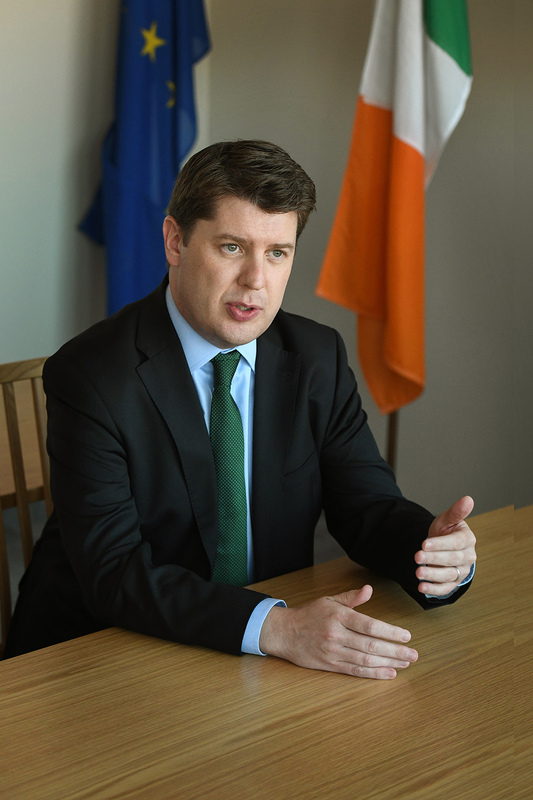Change language:
Ambassador Ronan: the Irish community in Hungary is active, vibrant – INTERVIEW

His excellency Ronan Gargan, the Ambassador of Ireland to Hungary, arrived to Budapest in December 2019, so he spent the coronavirus epidemic in Hungary. We asked him how he and his family feels in Hungary, what Hungarian products he would recommend for his Irish fellows, and what he likes most in Hungary. He also talked about the Irish community in Budapest and why Irish people move to Hungary.
DNH: You lived in Brussels with your family before coming to Hungary. What was your first thought when you found out that Budapest would be your new home for a couple of years?
Ronan Gargan: Excitement. I knew that I was coming to a really interesting city and country, with a fascinating if not complex history, not dissimilar to Ireland’s historical experience, and with a very rich culture. And I knew that my children would really enjoy it here, despite the lack of snow which I promised them! My experience of living here has only proven this and has been beyond my expectations.
DNH: Can you mention one thing that attracted you the most about Budapest?
Ronan Gargan: It is difficult to narrow it down to one but if pushed, it would have to be the culture – the arts, music, architecture, the café culture, the food culture. It such a vibrant city with so much to see and do and to enjoy.

DNH: How many Irish citizens live in Hungary approximately? In what fields do they typically work?
Ronan Gargan: We estimate that about 1000 Irish citizens live in Hungary with about 500 in Budapest. Their reasons for being here are varied: some our retired and have an Hungarian spouse, others work for international companies here while up to 200 of our citizens here are students, mostly based in Budapest.
DNH: How cohesive is the local Irish community? Do they have a main base in Budapest?
Ronan Gargan: It is a small but very active and vibrant Irish community. They do a lot to promote Irish culture here, especially around St. Patrick’s Day on 17 March, Ireland’s national day and to strengthen people-to-people links. For instance, the community will organise a St. Patrick’s Day parade on the streets of Budapest on 19 March, the first parade since 2019 due to COVID. The main organisers behind the parade as well as other Irish cultural, social and business events in Budapest is the Irish Hungarian Business Circle, who the Embassy works very closely with. The local GAA club, Budapest Gaels, who plays Gaelic football, one of Ireland’s national sports, is also a good centre for the Irish in Budapest but they are always looking for new players, including Hungarians!
DNH: What cultural, economic and folklore programmes does the Embassy organise?
Ronan Gargan: The Embassy has a very busy events calendar all aimed at promoting Ireland in Hungary and furthering our bilateral relations. Our main events are around St. Patrick’s day but we also have events around St. Brigid’s Day on 1 February, Ireland’s other patron saint, which celebrates the creativity of women through contemporary art and music. Bloomsday on 16 June is also an important time for us as it celebrates the Irish writer James Joyce and his book Ulysses, which has a unique link with Hungary as the family of the main character, Leopold Bloom or Virág, hails from Szombathely where each year we support a Bloomsday festival. We had a range of special events this year, including music, art and readings, to celebrate the centenary of the publication of Ulysses.

Halloween on 31 October is also becoming a moment to celebrate Irish culture such as the Irish tradition of storytelling as Halloween originated in Ireland around the Celtic festival of Oíche Samhain. The Embassy also has a Book Club which meets monthly to discuss new Irish fiction and we will soon support the launch a new Irish film club. We also work closely with Enterprise Ireland, Ireland’s trade and business agency, which is also present in Budapest and supports events aimed at promoting trade between Ireland and Hungary.
DNH: Thousands of people attended the St. Patrick’s Day event in Budapest before the COVID-19. What can we expect next year?
Ronan Gargan: The St. Patrick’s Day Parade in Budapest, which started in 2010 has grown over the years to be one of the biggest St. Patrick’s Day events in Europe outside Ireland. After a three year break due to COVID, the Embassy is delighted to support the IHBC in planning for the parade on 19 March 2023 which we hope will bring some Irish culture and colour to the streets of Budapest and once again attract thousands of Hungarians to share in our love of Irish culture and tradition and perhaps bring some Hungarian culture and tradition to the day.
DNH: A relatively large number of Hungarian workers have moved to Ireland and settled down there. However, there are also many who returned home after a few years with plenty of experience and life-long memories. Is there any link between the Embassy and Hungarians returning from Ireland?
Ronan Gargan: The Embassy very much values what we call our reverse diaspora, those Hungarian who have lived, worked or studied in Ireland, and continue to have a love for their home away from home. We consider them to be part of our extended Irish community here in Hungary and many get involved in our cultural events. I was delighted to see one such couple, Attila and Kinga Pécsi, who returned from Ireland after 10 years and opened a bakery in Budapest called arán, which means bread in the Irish language, and which does an amazing fusion of Irish and Hungarian baking traditions. There is also what we call the affinity diaspora, those Hungarian who have a love of Ireland, and who we work with, especially through some of the Irish Studies centres in Hungarian universities, to promote Irish culture. These people are invaluable to the strong links between the people of Ireland and the people of Hungary.
DNH: Can the Embassy provide information to Hungarian citizens who plan to move to Ireland to study or work? Are there any relevant and reliable websites that help you get familiarised with local conditions in Ireland?
Ronan Gargan: Ireland is great country to work in, to live in, to study in or to simply visit and we are also happy to provide advice and assistance to those in Hungary who may be considering a move to Ireland for whatever reason. A good website to find out more about moving to Ireland is www.citizensinformation.ie which has a dedicated section on practical information on moving to Ireland. The Tourism Ireland website, www.ireland.com and the government website, www.ireland.ie , also a give a good insight into what Ireland is all about.
DNH: By the way, what types of goods are traded between Hungary and Ireland? What types of Hungarian products would likely be in demand in your country? And what Irish products can Hungarian customers find on the shelves of local supermarkets?
Ronan Gargan: Trade between Ireland and Hungary is modest, standing at about €1 billion a year and there is definitely room for improvement, which the Embassy is working hard on improving together with Ireland’s trade agencies, such as Bord Bia, our food board, and Enterprise Ireland. Our shared membership of the EU and the Single Market offers the space and opportunity to improve our bilateral trade and investment. Most of the trade between the two countries is in services but there is also a good trade in goods, such as pharmaceuticals, medical devices and ICT equipment. But there is also some food so Hungarians should find Irish diary products on their shelves such as Kerrygold butter, the best butter in the world in my view, and Irish cheddar cheese as well as Irish beef and lamb, Irish seafood and of course Irish whiskey, such as Jameson and Irish beer, such as Guinness. For Irish people, I think that they would like to see more Hungarian wines on their shelves. Hungarian wines is one of the world’s best kept secrets and there are some many amazing grape varieties that makes for very tasty wine, red and white.
DNH: Many Hungarians live beyond our borders as well. How would you describe the relationship between Northern Ireland and Ireland for those who have never been to these two places?
Ronan Gargan: The island of Ireland, both north and south, is at peace now and there is deep and friendly north-south cooperation is areas such as tourism, energy, culture, trade and much more besides. This was made possible by the 1998 peace agreement, the Good Friday Agreement, at the heart of which is respect for the different national and cultural identities on the island and which led to there being no physical border on the island. The achievements of the peace process were made possible by Ireland and the UK’s shared EU membership and this is why the UK’s departure from the EU has presented particular and unique challenges for Ireland. All sides are committed, however, to ensuring that the Good Friday Agreement and the gains of the peace process are protected, as well as Ireland’s place at the heart of the EU, and this is at the centre of the EU-UK withdrawal agreement. Problems persist but we are committed to resolving these as part of the EU team and in partnership with the UK. The work of reconciliation between communities on the island continues and much work needs to be done to address the deep scars left by over 30 years of conflict but the Good Friday Agreement continues to be the only way to resolve this outstanding challenges.
DNH: What are the first things you mention about our country when you invite your Irish friends to Hungary? What are the Hungarian places, foods and events that would make an Irish person’s heart beat faster?
Ronan Gargan: I mention a lot to my friends and family when they are coming to visit me in Hungary, too many to mention here as there is so much to experience. Of course I mention the amazing city scape that is beautiful Budapest, including the parliament building, the castle area and fisherman’s Bastion, which must be seen at night from a cruise on the Danube. I mention the thermal baths and I mention the amazing musical culture offered by the breath taking opera house and many other cultural venues. And of course, I mention the food such as Goulash and Langos, as well as the wine and the need to take a wine route around the many beautiful vineyards of Hungary. And I mention the wonderful places to visit all around Hungary such as the amazing Lake Balaton and other historical cities such as Esztergom, Eger, Pécs and Györ. The problem is finding the time to squeeze it all in!









